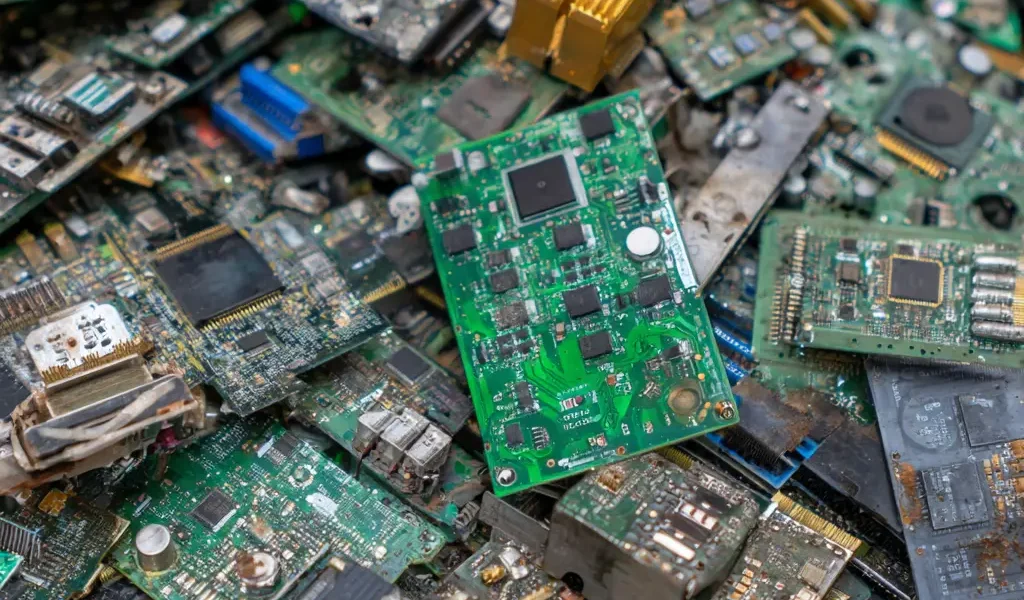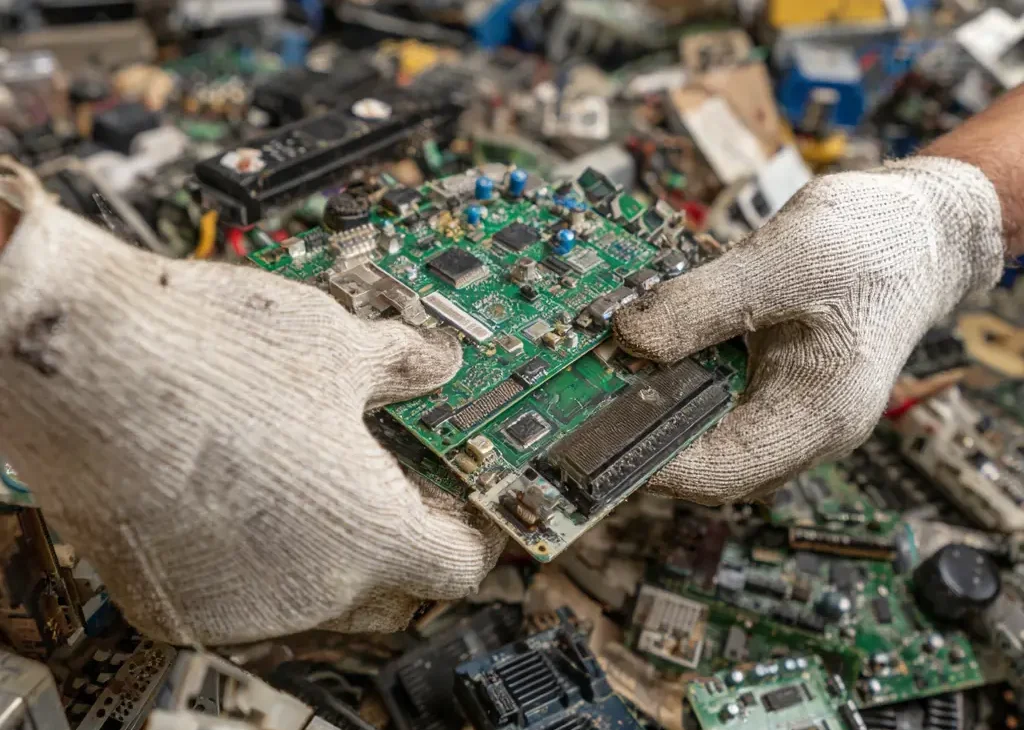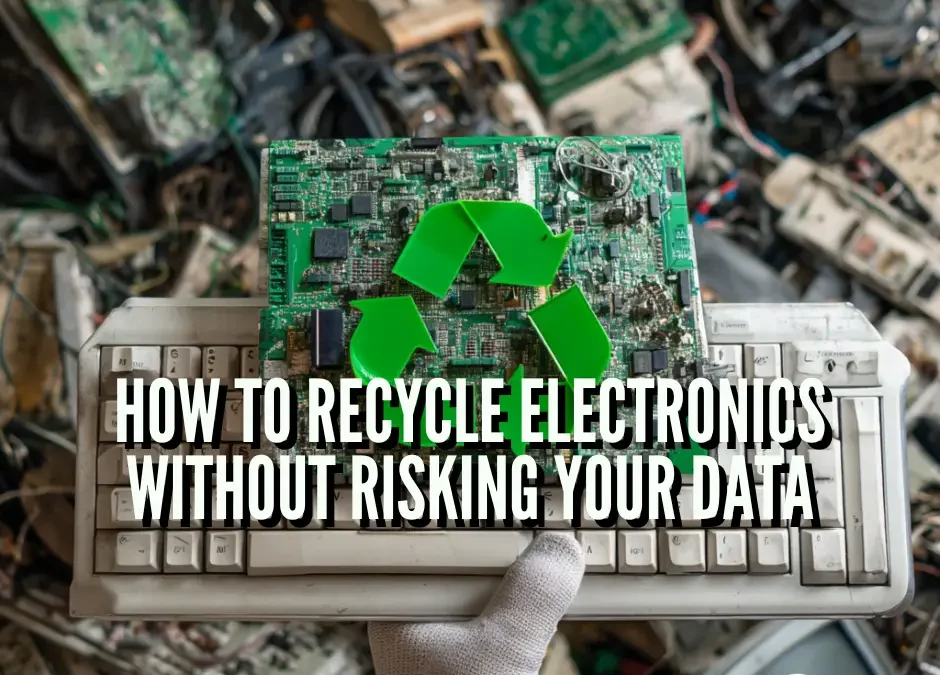Old phones, laptops, and cables pile up fast, and tossing them in the trash is risky. Electronics contain metals that can be reused and chemicals that shouldn’t end up in a landfill. At the same time, your old hard drive could still hold sensitive data. That’s why recycling electronics the right way is more than just an eco-friendly choice, it’s also about keeping your information safe.
Why should you recycle electronics responsibly?
Electronics don’t break down like regular trash. Circuit boards and batteries contain toxins that can leach into soil and water. Computer recycling services keep those harmful materials out of the environment and allow valuable metals like copper, gold, and palladium to be reused.
On top of that, any device you throw away may still hold sensitive data. Hard drives, smartphones, and tablets can contain personal or business information that hackers could exploit if the devices aren’t properly wiped. Secure recycling with certified providers ensures that both your data and the planet are protected.
Which electronics can you recycle, donate, or sell?
Most common electronics can be recycled, including:
- Phones, tablets, and laptops
- Desktops and servers
- Monitors and TVs
- Printers and networking gear
- Small household gadgets
Some items need extra attention, such as lithium-ion batteries or older CRT monitors. These often require special handling. If a device is still working, donating it to a local nonprofit or school can extend its life and keep it useful. And when a device has reached the end of its life, the safest step is turning to a certified computer recycling provider.
What you can’t recycle and why
Not every electronic can go into a recycling bin. Items like smoke detectors, broken light bulbs, and large appliances such as refrigerators are often rejected because they contain chemicals or components that require different disposal methods. Non-recyclable items may end up contaminating batches of recyclable materials, making the process unsafe and more costly. Always check with your local recycler about accepted items before you drop off your gear.

How do you prepare and wipe devices before recycling?
Before recycling, always back up your files. Then, wipe or reset the device. On phones and tablets, perform a factory reset. For computers, use data-wiping software to erase the hard drive securely.
The risks of recycling without wiping your data
Recycling devices without clearing them first is a serious security risk. Old laptops, phones, and hard drives can hold bank logins, work emails, customer files, or personal photos. If those devices fall into the wrong hands, the data can be exploited for identity theft or corporate breaches. Even “deleted” files often remain recoverable unless properly erased. That’s why it’s crucial to wipe devices yourself, and then trust a certified recycler that uses industry-grade destruction methods.
Look for recyclers that carry certifications such as R2 or e-Stewards, which confirm that they follow strict environmental and data security standards.
What are the best practices for choosing a certified recycler?
Not all recycling centers are created equal. A trustworthy recycler will:
- Hold certifications like R2 or e-Stewards
- Be transparent about where materials go
- Provide documentation of proper disposal
Reading reviews and asking about their processes can save you from working with a provider that ships waste overseas or cuts corners.

Can you make money selling old hardware?
Yes, you can. Many old devices and parts still hold value.
What sells?
- Smartphones, especially recent models
- Laptops and tablets
- Computer parts like graphics cards, RAM, and SSDs
How to maximize profit
- Clean and repair if possible: A device that looks and works better will fetch a higher price.
- Choose the right platform:
- Peer-to-peer marketplaces like eBay, Facebook Marketplace, or Nextdoor can get you the most money.
- Resale services like Swappa or DeCluttr offer convenience with prepaid shipping.
- Trade-in programs from Amazon, Best Buy, Apple, or your wireless carrier are fast but usually pay less.
- Wipe your data: Never sell a device without securely erasing it.
- Be honest in your listing: Clear descriptions and good photos help attract buyers.
If your device isn’t worth much, recycling it through a certified provider is the safer bet.
What happens to electronics after they are recycled?
A common question people have is: where do recycled electronics actually go?
When you recycle responsibly, devices are dismantled into their main components. Plastics, metals, and circuit boards are separated, melted down, or processed into reusable raw materials. Precious metals like gold and silver are extracted for reuse in new electronics. Hazardous materials, such as lead or mercury, are isolated and handled under strict environmental controls.
In some cases, still-functional parts (like RAM or screens) are refurbished and reused in other devices, reducing demand for new resources. By choosing a certified recycler, you can be confident your old tech won’t end up in a landfill overseas but instead contributes to building the next generation of electronics responsibly.
FAQ
Can I recycle electronics at home?
Yes, but you’ll need to drop them at a local certified center or retailer. Best Buy and Staples often accept old electronics.
What happens to my data when I recycle?
If you use a certified provider, your data is wiped or destroyed. Always erase your own device first for extra security.
Does it cost money to recycle?
Sometimes, especially for items like TVs or monitors. Many other devices can be recycled for free.
Is it better to repair or recycle?
If a repair is simple and affordable, extending a device’s life is often the greener choice. If not, recycling ensures safe disposal.
What certifications should I look for in a recycler?
R2 and e-Stewards are the main certifications that guarantee responsible handling of electronics and data.
The ITGuys team has proudly supported Colorado businesses since 2009. From IT support to cybersecurity and beyond, we’re here to keep your technology running smoothly.
Contact us today to get started.
Call us: (303) 578-6256
Visit us: 1738 Wynkoop St, Suite 303, Denver, CO 80202


Recent Comments